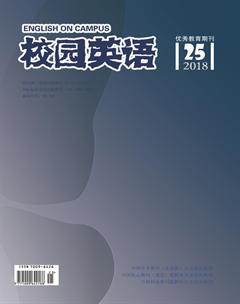Influences of Web Fiction on Chinese College Students
【摘要】本文通過抽样选取河南师范大学300名学生进行研究,阐述了网络小说对大学生阅读、写作和思考的影响。研究表明,网络小说对大学生而言是一把双刃剑,利弊兼并。一方面,大学生可以借助互联网和智能手机迅速获取知识。另一方面,由于网络信息的复杂性,大学生在阅读和写作中表现得很差,缺少正确的审美观念。在这种情况下,本文提出了解决这类问题的有效措施.
【关键词】网络文学;大学生;阅读;写作;思考
【Abstract】This article illustrates the influences of Web fiction on college students reading, writing and thinking by taking a lateral study among three hundred students in Henan Normal University. On the one hand, Web fiction could spread knowledge and mobilize students enthusiasm in a much cheaper way. On the other hand, due to the complexity of online information, college students may be perfunctory in their reading and writing, which result in the degeneration of their aesthetic perception. In this case, this article gives effective measures to solve such problems from various aspects.
【Key words】Web fiction; College Students; Reading; Writing; Thinking
【作者简介】刘会娴(1997- ),女,汉族,河南安阳人,河南师范大学,本科,研究方向:英语语言学。
I. Introduction
Web fiction refers to written material of literature available mainly or solely on the Internet. The fast development of Web fiction is already an undisputable fact over the past twenty years. Although Web fiction has been hotly debated at present, college students spend a lot of time reading online. According to the data provided by Iresearch Company, college students are 83.1% of all online readers. As more and more college students choose to read online, Web fiction shows different impacts on college students.
II. Method
Previous work on Web fiction mainly focuses on its influence on the ideological education of college students. In this work, the author aims to find the influences of Web fiction and to give suggestions accordingly. We study three types of college students– freshmen, sophomores and junior students. And select 100 representatives for each type, included 50 girls and 50 boys. Since it is hard to find students who dislike Web fiction, we select 10 representatives in total, include 5 students who love reading online and 5 students who hate reading Web fiction.
III. Results and Discussion
According to the first survey, 93% of the representatives prefer to read Web fiction; 90% of the representatives think that Web fiction is more attractive than books. As for the impact on reading, 60% of the students think Web fiction provides more reading material. 42% students believe it is a platform for people who like literature to write, communicate and display. Yet 73.83% of the college students consider Web fiction needs to improve the quality. What is more, Web fiction influences college students attitudes toward life deeply. College students can get inspiration and confidence from the adventure of heroes. But most online novels show that the protagonists tend to live a life that only values personal enjoyment. As a result, 45% of the students believe that pure love is the most important part of life.
IV. Solutions
Forceful measures must be taken to solve such problems. The government need to strengthen the management of the websites and guide network literature to develop in a healthy way. Web fiction must improve its quality and provides readers with more various works. Then, parents and teachers should first give more understanding to students and be tolerant of their immature state of mind. Finally, college students should behave themselves and strengthen self-control.
V. Conclusion
In this work, we extensively study the influences of Web fiction on college students. We construct two studies, and extensive statistical tests are conducted to analyze the collected data. Web fiction benefits college students building of cognitive structure and inspire college students to write more. However, thanks to the similarly vulgar contents and genre, Web fiction still has some problems. Different social institutions should take up the responsibility to make a better online environment for college students.
References:
[1]Bergmann,P.G.(1993).The New Encyclopedia Britannica.Chicago:Encyclopedia Britannica.Higgins,J.(Ed).(1988).Psychology.New York:Norton.
[2]Mellers,B.A.(2000).Choice and the relative pleasure of consequences.Psychological Bulletin.
[3]傅其林.網络文学的付费阅读现象[J].学习与探索,2010.
[4]欧阳友权.网络文学概论[M].北京:北京大学出版社,2008.

